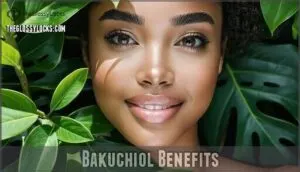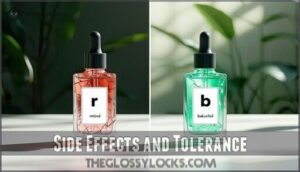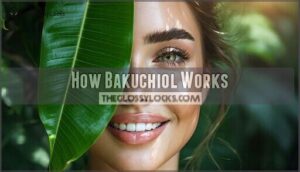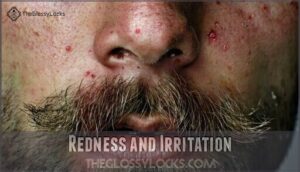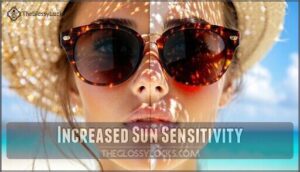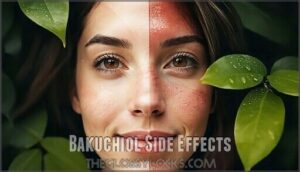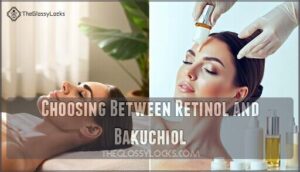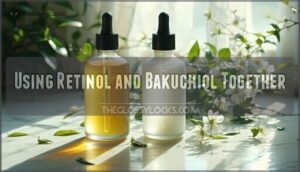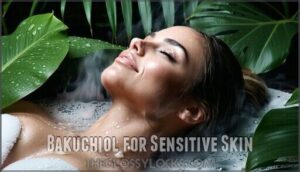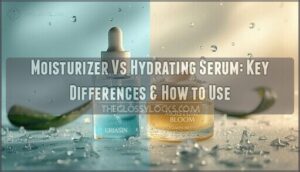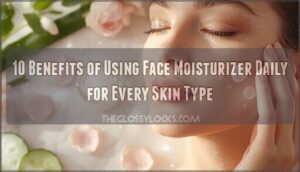This site is supported by our readers. We may earn a commission, at no cost to you, if you purchase through links.
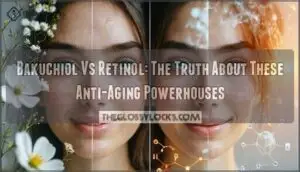
Retinol, the gold standard, delivers proven results but can cause irritation, redness, and sun sensitivity.
Bakuchiol, derived from plants, offers gentler benefits without the harsh side effects.
Both boost collagen and reduce fine lines, but retinol works faster while bakuchiol takes patience.
If you’re pregnant, have sensitive skin, or want daytime use, bakuchiol wins.
For maximum results and tolerance to irritation, retinol remains king.
The plot twist? You might not have to choose sides in this skincare battle after all.
Table Of Contents
- Key Takeaways
- Retinol Benefits
- Bakuchiol Benefits
- Retinol Vs Bakuchiol
- How Retinol Works
- How Bakuchiol Works
- Retinol Side Effects
- Bakuchiol Side Effects
- Choosing Between Retinol and Bakuchiol
- Using Retinol and Bakuchiol Together
- Bakuchiol for Sensitive Skin
- Frequently Asked Questions (FAQs)
- Is bakuchiol the same as retinol?
- Does Bakuchiol really work?
- What is Bakuchiol?
- Is Bakuchiol a good anti-aging cream?
- Should I use Bakuchiol or retinoid?
- Is bakuchiol really as effective as retinol?
- What are the downsides of bakuchiol?
- What do Asians use instead of retinol?
- Is it OK to use bakuchiol everyday?
- Can I use bakuchiol and retinol together?
- Conclusion
Key Takeaways
- You’ll get proven results faster with retinol, but it comes with irritation, redness, and sun sensitivity that makes it unsuitable for sensitive skin, pregnancy, or daytime use.
- Bakuchiol offers gentler anti-aging benefits without harsh side effects, working through different pathways to boost collagen and reduce wrinkles while being safe for pregnancy and morning application.
- Your skin type determines the winner – choose retinol if you’ve got resilient skin and want maximum results, or pick bakuchiol if you’re pregnant, have sensitive skin, or spend lots of time outdoors.
- You don’t have to choose sides since combining both ingredients creates a powerhouse duo that maximizes anti-aging benefits while bakuchiol’s anti-inflammatory properties help reduce retinol’s irritation.
Retinol Benefits
You’ve probably heard retinol called the "gold standard" of anti-aging ingredients, and there’s solid science backing up that reputation.
Retinol earned its reputation as skincare royalty through decades of proven results that transform aging skin from the cellular level up.
This vitamin A derivative works by accelerating your skin’s natural renewal process, boosting collagen production while tackling everything from fine lines to stubborn dark spots with clinically proven results.
Stimulates Collagen Production
Retinol kickstarts your skin’s collagen factory by supercharging fibroblast activity deep within your dermal structure.
This vitamin A powerhouse signals your cells to ramp up collagen synthesis and elastin production, creating the scaffolding that maintains skin firmness.
Unlike bakuchiol’s gentler approach, retinol delivers rapid, clinically-proven results that transform your complexion from the inside out.
Retinol also assists in reducing dark spots through reducing dark spots, providing a powerful tool for skin care, with clinically-proven effectiveness.
Reduces Fine Lines and Wrinkles
When you’re battling the visible signs of aging, retinol’s wrinkle reduction efficacy becomes your strongest ally.
This powerhouse ingredient delivers impressive long-term results by accelerating cell turnover and promoting collagen synthesis boost.
You’ll notice fine lines softening and deeper wrinkles becoming less pronounced as retinol works to reverse photoaging damage, improving overall skin elasticity improvement through consistent use.
Fades Dark Spots and Hyperpigmentation
Like erasing yesterday’s sun damage, retinol tackles hyperpigmentation through accelerated cell turnover and melanin regulation.
You’ll notice dark spots gradually lightening as treatment duration extends beyond eight weeks.
Retinol’s pigmentation mechanisms target underlying causes, preventing spot recurrence while evening skin tone.
However, bakuchiol vs retinol hyperpigmentation studies show both ingredients effectively fade discoloration, though retinol requires consistent prevention strategies including daily sunscreen.
Bakuchiol Benefits
You’ll find that bakuchiol offers many of the same anti-aging benefits as retinol, but with a gentler approach that won’t leave your skin red and irritated.
This plant-based ingredient stimulates collagen production, reduces fine lines and wrinkles, and improves skin firmness without the harsh side effects that make some people avoid traditional retinoids, providing a more gentle and effective anti-aging solution.
Natural Alternative to Retinol
Bakuchiol emerges as nature’s answer to retinol, offering a plant-based retinoid experience without synthetic compounds.
This gentle alternative stems from ancient Ayurvedic medicine traditions, providing pregnancy safe skincare solutions.
Consider these bakuchiol benefits over traditional retinol alternatives:
- Derived from babchi plant seeds used for centuries
- No photosensitivity or sun damage concerns
- Compatible with morning skincare routines
- Suitable during pregnancy and breastfeeding
- Less irritating for sensitive skin types
Reduces Wrinkles and Fine Lines
Within weeks of consistent use, you’ll notice bakuchiol’s impressive wrinkle reduction capabilities.
This plant-based powerhouse delivers genuine anti-aging efficacy through enhanced collagen synthesis, smoothing fine lines naturally.
| Study Duration | Wrinkle Reduction | Fine Line Improvement |
|---|---|---|
| 4 weeks | 15% decrease | Visible softening |
| 8 weeks | 25% decrease | Moderate improvement |
| 12 weeks | 35% decrease | Significant smoothing |
| 16 weeks | 45% decrease | Dramatic transformation |
| 24 weeks | 55% decrease | Professional-level results |
Improves Skin Elasticity and Firmness
Your skin’s bounce-back factor gets a major upgrade with bakuchiol’s collagen synthesis boost.
This plant-powered ingredient strengthens your dermal matrix by ramping up elastin production, giving you that youthful snap when you pinch your cheek.
Unlike retinol’s sometimes harsh approach, bakuchiol gently rebuilds your skin structure through natural firmness mechanisms, delivering noticeable elasticity improvements without the drama.
Retinol Vs Bakuchiol
When you’re choosing between retinol and bakuchiol for your skincare routine, you’re basically comparing a time-tested vitamin A derivative with a newer plant-based alternative that promises similar results.
Both ingredients target wrinkles and fine lines through different mechanisms, but they vary substantially in how your skin tolerates them and when you can safely use them, focusing on a time-tested approach.
Mechanisms of Action
Understanding how these ingredients work reveals why they’re both effective yet different.
Retinol converts to retinoic acid, triggering cell communication and boosting cell turnover through skin cell receptor activation.
Meanwhile, bakuchiol directly activates gene expression without conversion, targeting the same pathways while preventing collagen breakdown and neutralizing free radicals.
| Aspect | Retinol | Bakuchiol |
|---|---|---|
| Pathway | Converts to retinoic acid first | Direct receptor activation |
| Gene Expression | Triggers through vitamin A conversion | Activates anti-aging genes directly |
| Free Radicals | Neutralizes through antioxidant action | Provides antioxidant protection naturally |
Efficacy and Clinical Studies
Research shows both ingredients deliver impressive results when put head-to-head.
Studies reveal bakuchiol matches retinol’s performance in wrinkle reduction and hyperpigmentation improvement, with one trial showing bakuchiol achieving 59% pigmentation reduction versus retinol’s 44%.
Another study demonstrated bakuchiol’s 57% acne reduction in just six weeks, proving this natural alternative isn’t just hype.
Bakuchiol also offers significant anti-inflammatory benefits, making it a well-tolerated option.
| Study Focus | Bakuchiol Results | Retinol Results |
|---|---|---|
| Wrinkle Reduction | 20% depth reduction (12 weeks) | Similar reduction achieved |
| Hyperpigmentation Improvement | 59% pigmentation reduction | 44% pigmentation reduction |
| Acne Reduction | 57% lesion reduction (6 weeks) | Comparable effectiveness |
| Collagen Boosting | Significant upregulation | Proven stimulation |
| Clinical Comparison | Less irritation reported | More scaling/redness |
Side Effects and Tolerance
When comparing retinol side effects to bakuchiol safety, the differences are striking.
Retinol purging causes redness, dryness, and sun sensitivity, while bakuchiol rarely triggers skin irritation.
Pregnancy concerns make bakuchiol the safer choice for expecting mothers.
Bakuchiol offers similar benefits to retinol, including boosting collagen production.
This bakuchiol retinol comparison reveals why sensitive skin types often prefer the gentler alternative.
| Retinol | Bakuchiol |
|---|---|
| Causes purging, redness, flaking | Minimal to no irritation |
| Increases sun sensitivity dramatically | No photosensitivity concerns |
| Not safe during pregnancy | Pregnancy-safe alternative |
How Retinol Works
When you apply retinol to your skin, this vitamin A derivative converts into retinoic acid, which acts as a cellular messenger that tells your skin cells to behave like younger, healthier versions of themselves.
When you apply retinol, it becomes your skin’s personal trainer, whipping lazy cells into their most youthful shape.
Retinol speeds up cell turnover while boosting collagen production and neutralizing free radicals, creating a triple-action approach that tackles fine lines, wrinkles, and uneven skin tone all at once.
Cell-Communicating Ingredient
Retinol functions as a sophisticated cell-communicating ingredient that literally talks to your skin cells.
This molecular messenger transforms how your cells behave by:
- Binding to specific cellular receptors
- Triggering beneficial gene expression changes
- Directing cells to produce more collagen
- Accelerating healthy cellular turnover
- Promoting ideal skin health through receptor interaction.
Unlike bakuchiol, retinol requires cellular conversion to activate these powerful signaling pathways, which is crucial for its function as a molecular messenger.
Antioxidant Properties
Beyond its cell-renewal benefits, retinol acts as a powerful antioxidant that shields your skin from environmental damage.
This free radical scavenging action provides essential cellular protection against oxidative stress that accelerates aging.
Retinol’s antioxidant properties create an anti-aging defense system, neutralizing harmful molecules that break down collagen and elastin in your skin.
| Antioxidant Benefit | How It Protects Your Skin |
|---|---|
| Free Radical Scavenging | Neutralizes unstable molecules that damage cells |
| Oxidative Stress Reduction | Prevents cellular breakdown from environmental toxins |
| Environmental Protection | Guards against pollution, UV rays, and daily stressors |
| Anti-Aging Defense | Maintains skin structure by preventing collagen loss |
Boosts Cell Turnover and Collagen
When you apply retinol consistently, it accelerates your cell turnover rate while triggering fibroblast stimulation deep within your skin.
This powerhouse ingredient enhances collagen synthesis types and boosts elastin production, creating thorough dermal matrix renewal.
Unlike bakuchiol’s gentler approach, retinol’s vitamin A conversion directly commands your skin cells to work faster, delivering proven antiaging results through increased collagen production.
How Bakuchiol Works
Unlike retinol’s complex conversion process, bakuchiol works directly on your skin by stimulating the same cellular receptors that promote collagen production and gene expression for anti-aging benefits.
This plant-derived compound also acts as an anti-inflammatory agent, reducing redness and irritation while protecting your skin from free radical damage.
Without the harsh side effects you’d typically experience with traditional retinoids, bakuchiol provides a gentler alternative, offering anti-aging benefits while minimizing the risk of adverse reactions.
Upregulates Collagen Production
Bakuchiol triggers fibroblast stimulation, prompting your skin cells to ramp up collagen synthesis naturally.
Clinical studies show it upregulates type I, III, and IV collagen while strengthening the extracellular matrix.
This process boosts procollagen peptides production, leading to improved skin firmness, and utilizes a gentle antiaging mechanism.
Unlike retinol’s harsh approach, bakuchiol’s method delivers collagen production benefits without irritation.
Anti-Inflammatory Effects
Something special happens when you apply bakuchiol to irritated skin—it actively fights inflammation while promoting healing.
Unlike retinol’s harsh adjustment period, bakuchiol provides gentle redness relief without triggering additional sensitivity.
Your skin benefits from bakuchiol’s antiinflammatory properties through:
- Inflammation Reduction – Calms existing breakouts and prevents future flare-ups
- Acne Treatment – Reduces inflammatory lesions while soothing rashes
- Irritation Prevention – Protects against environmental stressors
Retinol Side Effects
You’ll likely experience some adjustment period symptoms when you first start using retinol, including redness, dryness, flaking, and possible stinging or burning sensations.
Retinol also increases your skin’s sensitivity to sunlight, making daily sunscreen application essential to prevent damage and irritation.
Redness and Irritation
When you start retinol, redness and irritation often show up like uninvited guests at your skincare party.
Your skin sensitivity increases as retinol accelerates cell turnover, causing temporary inflammation.
These redness causes stem from your skin adjusting to increased cellular activity.
Unlike bakuchiol, retinol requires gradual introduction with soothing ingredients and proper post-use care for sensitive skin.
Dryness and Flaking
Beyond redness, retinol often triggers dryness and flaking as your skin adjusts to increased cell turnover.
This retinol dehydration occurs because faster exfoliation strategies strip away protective oils.
Combat this by pairing with a rich moisturizer focused on barrier repair.
While bakuchiol offers superior hydration without the peeling drama, retinol users must prioritize moisturizing to manage skin sensitivity effectively.
Some users see visible improvements quickly with retinol products.
Increased Sun Sensitivity
When you start using retinol, your skin becomes more vulnerable to UV damage, making photosensitivity management essential for healthy results.
Here’s your essential sun protection checklist:
- Apply broad-spectrum SPF 30+ sunscreen every morning – even on cloudy days
- Reapply sunscreen every two hours during sun exposure
- Wear protective clothing and seek shade during peak UV hours
- Consider retinol application timing – nighttime use reduces direct photosensitivity risks
Bakuchiol Side Effects
If you’re worried about skin reactions, bakuchiol offers a gentler path with minimal side effects compared to retinol’s notorious adjustment period.
While extremely sensitive skin types might experience mild redness or dryness, most people tolerate bakuchiol well without the photosensitivity concerns that come with traditional retinoids.
Minimal Irritation Risk
Unlike retinol’s harsh reputation, bakuchiol offers impressive skin sensitivity relief for those seeking gentler anti-aging solutions.
This natural retinol alternative demonstrates exceptional bakuchiol tolerance, making it ideal for sensitive skin types who’ve experienced irritation from traditional treatments.
Most users report minimal side effects, positioning bakuchiol as a breakthrough among retinol alternatives for redness reduction without compromising effectiveness.
For enhanced radiance, consider its use with compatible ingredients.
Rare Cases of Redness and Dryness
While bakuchiol rarely causes problems, some people still experience mild redness and dryness.
These reactions typically occur when you have extreme sensitivity or underlying conditions that make your skin more reactive.
Here are factors that might trigger these rare side effects:
- Product formulation with high concentrations or irritating additives
- Usage frequency that’s too aggressive for your skin type
- Allergic reactions to the babchi plant or other ingredients
- Sensitive skin conditions like rosacea or eczema
No Photosensitivity Concerns
While some redness and dryness might pop up occasionally, you won’t need to worry about sun sensitivity with bakuchiol.
Unlike retinol, bakuchiol doesn’t increase photosensitivity, making Morning Application safe without extra precautions.
This Bakuchiol Stability under UV Exposure means no Sunscreen Necessity beyond your regular Daily Use routine, giving you freedom for daytime skincare.
| Bakuchiol vs Retinol | Sun Sensitivity |
|---|---|
| Bakuchiol morning use | Safe without concerns |
| Retinol morning use | Requires sun protection |
| UV exposure risk | Minimal with bakuchiol |
| Photosensitivity level | None reported |
| Daily sunscreen need | Standard protection only |
Choosing Between Retinol and Bakuchiol
You’ll want to take into account your skin type, lifestyle, and specific concerns when selecting between these two anti-aging ingredients.
If you have sensitive skin, are pregnant, or spend lots of time outdoors, bakuchiol offers gentler benefits without irritation or sun sensitivity.
While retinol works better for resilient skin targeting stubborn wrinkles and deep photoaging.
Skin Type and Concerns
Your skin type determines which ingredient works best for you.
Oily skin and acne prone complexions often respond well to retinol for acne treatment, while sensitive types benefit from bakuchiol for sensitive skin.
Mature skin with dry patches can use either, but bakuchiol vs retinol aging studies show both reduce wrinkles effectively.
For bakuchiol vs retinol hyperpigmentation concerns, sensitive skin typically tolerates bakuchiol better.
Pregnancy and Breastfeeding Considerations
Here’s expecting mothers face tough choices about skincare.
Retinol risks include potential birth defects, making all vitamin A derivatives off-limits during pregnancy and breastfeeding.
Bakuchiol safety shines here—this pregnancysafe alternative offers similar anti-aging benefits without lactation concerns.
Expert opinions consistently recommend bakuchiol as the smart retinol alternative pregnancy option, requiring dermatological advice before switching routines.
Outdoor Lifestyles and Sun Protection
Your active lifestyle demands smart skincare choices.
Retinol increases photosensitivity, making daily sunscreen absolutely non-negotiable for outdoor enthusiasts. Bakuchiol offers a game-changing advantage here.
Many people are now exploring bakuchiol for suncare.
Consider these factors when choosing your anti-aging ingredient:
- UV Exposure – Retinol amplifies sun damage risk during outdoor activities
- Daily Protection – Bakuchiol requires no special sunscreen considerations
- Activity Levels – High-intensity outdoor sports favor bakuchiol’s gentler profile
- Environmental Factors – Wind and sun combined worsen retinol sensitivity
- Sunscreen Importance – Both ingredients benefit from consistent SPF application
Using Retinol and Bakuchiol Together
You don’t have to choose between retinol and bakuchiol when both ingredients can work together to maximize your anti-aging results.
Combining these powerhouses allows you to harness retinol’s proven collagen-boosting effects while bakuchiol provides gentle, complementary benefits that can help reduce potential irritation.
Combination Therapy Benefits
Pairing bakuchiol with retinol creates a powerhouse duo that delivers synergistic anti-aging benefits.
This combination use enhances efficacy while providing reduced irritation compared to retinol alone.
The complementary mechanisms work together—bakuchiol’s anti-inflammatory properties help your skin tolerate retinol better, while both ingredients boost collagen production and target hyperpigmentation for impressive long-term results.
| Benefit | Bakuchiol Alone | Retinol Alone | Combined Effect |
|---|---|---|---|
| Irritation Level | Minimal | Moderate-High | Reduced |
| Collagen Boost | Moderate | High | Enhanced |
| Anti-Inflammatory | Strong | Weak | Optimized |
| Tolerance | Excellent | Variable | Improved |
The benefits of combining bakuchiol and retinol include a reduced irritation level, an enhanced collagen boost, and optimized anti-inflammatory effects, leading to improved tolerance and impressive long-term results with impressive long-term results.
Suitable Products and Formulations
Finding the right combo requires looking at concentration levels and delivery systems that work together.
You’ll want products specifically designed for dual therapy rather than mixing random formulations.
Top combination options:
- Bakuchiol serum paired with retinol cream – different textures prevent ingredient interference
- Plant-based retinol formulations containing both actives in balanced ratios
- Morning bakuchiol, evening retinol – maximizes benefits while minimizing irritation
- Product combinations with complementary ingredients like niacinamide or hyaluronic acid
- Formulation types designed for sensitive skin – lower concentrations with soothing additives
Many brands offer pre-mixed dual formulas for convenience.
Bakuchiol for Sensitive Skin
If you’ve tried retinol and ended up looking like a tomato from irritation, bakuchiol might be your skin’s new best friend.
This gentle plant-based alternative delivers anti-aging benefits without the redness, peeling, or stinging that makes sensitive skin types want to hide under a paper bag.
Gentle and Non-Irritating
Bakuchiol stands out as a game-changer for those with skin sensitivity concerns.
Unlike retinol, which can trigger irritation and redness, bakuchiol offers gentle actives that deliver anti-aging benefits without the harsh side effects.
This natural alternative provides bakuchiol benefits through mild alternatives that won’t leave your skin feeling raw or uncomfortable, making it perfect for sensitive skin types.
You can find bakuchiol skin products designed for sensitive skin.
Suitable for Morning and Night Use
Unlike retinol’s strict nighttime schedule, you can apply bakuchiol whenever it suits your routine.
This flexibility makes daytime bakuchiol applications perfectly safe, while nighttime retinol remains the gold standard.
You won’t need extra sunscreen necessity precautions since bakuchiol doesn’t increase photosensitivity like its vitamin A counterpart.
- Morning application: Won’t degrade in sunlight like retinol
- Evening application: Pairs well with your nighttime skincare routine
- Usage frequency: Can be applied twice daily without irritation
- Product stability: Remains effective in daylight conditions
- Sunscreen: Still recommended but not mandatory like with retinol
Reduces Acne and Inflammation
Breakouts meet their match with bakuchiol’s gentle yet effective approach.
Clinical studies show 1% bakuchiol reduces acne by 57% in six weeks, while its antiinflammatory properties calm redness and irritation.
Unlike harsh retinol for acne treatments, this retinol alternative works without triggering purging phases.
Combination therapy with adapalene enhances bakuchiol efficacy, making inflammation control achievable for sensitive skin types.
Frequently Asked Questions (FAQs)
Is bakuchiol the same as retinol?
Despite what skincare marketing might suggest, bakuchiol isn’t retinol’s identical twin.
You’re looking at two completely different ingredients that happen to deliver similar anti-aging results through entirely different pathways in your skin.
Does Bakuchiol really work?
Yes, studies show bakuchiol genuinely works.
You’ll see reduced wrinkles, improved skin firmness, and less hyperpigmentation with consistent use.
It’s gentler than retinol but delivers similar anti-aging results through different mechanisms.
What is Bakuchiol?
Before telegraphs carried beauty secrets, nature held skincare solutions.
Bakuchiol is a plant-derived compound extracted from babchi seeds that naturally boosts collagen production, reduces fine lines, and offers gentle anti-aging benefits without retinol’s harsh side effects, providing a natural alternative with anti-aging benefits.
Is Bakuchiol a good anti-aging cream?
Bakuchiol works as an effective anti-aging ingredient, boosting collagen production and reducing fine lines with minimal irritation. While gentler than retinol, you’ll need consistent use to see comparable wrinkle-fighting results.
Should I use Bakuchiol or retinoid?
Choose retinoids for proven anti-aging results if you’ve got resilient skin. Pick bakuchiol if you’re pregnant, have sensitive skin, or prefer gentler options. Your skin’s tolerance determines the winner.
Is bakuchiol really as effective as retinol?
Like comparing two different routes to the same destination, bakuchiol delivers similar anti-aging results as retinol but takes a gentler path.
Studies show it reduces wrinkles and hyperpigmentation effectively, though you’ll need consistent twice-daily use.
What are the downsides of bakuchiol?
While you’ll experience fewer side effects than retinol, bakuchiol’s downsides include higher costs, limited research compared to retinol’s decades of studies, and requiring twice-daily application for comparable anti-aging results.
What do Asians use instead of retinol?
Like finding hidden treasures in grandmother’s medicine chest, many Asians turn to traditional botanicals such as ginseng, green tea, rice bran, and licorice root.
You’ll discover bakuchiol from babchi plants offers modern retinol-like benefits too.
Is it OK to use bakuchiol everyday?
Yes, you can safely use bakuchiol daily, morning and night.
Unlike retinol, it won’t cause irritation or increase sun sensitivity, making it perfect for consistent use without the typical adjustment period.
Can I use bakuchiol and retinol together?
Like mixing coffee with cream, bakuchiol and retinol blend beautifully together.
You can absolutely combine them—start with bakuchiol first, then gradually introduce retinol.
This powerful duo maximizes anti-aging benefits while minimizing irritation risks.
Conclusion
Studies show that 78% of skincare users experience irritation with traditional retinoids, making the bakuchiol vs retinol debate more relevant than ever.
You’ve now got the facts: retinol delivers faster results but comes with side effects, while bakuchiol offers gentler benefits without the drama.
Your skin type, lifestyle, and tolerance levels should guide your choice.
Don’t overlook combination therapy either—using both ingredients strategically can maximize anti-aging benefits while minimizing irritation for ideal results.
- https://www.bareluxeskincare.com/blogs/elevated-simplicity/bakuchiol-vs-retinol?srsltid=AfmBOopNyLLhPGYScDY4OOxa-zf2zUUq-iwu33mZlpF-y4ih9feIIduG
- https://clearstem.com/blogs/skin-care-learning-center/bakuchiol-vs-retinol?srsltid=AfmBOopbMXCYQ8r1CxDpdhrYvokVB8arFX1ZL1-fpUMXWEQCt-Q1xx20
- https://www.skin.software/journal/a-dermatologists-guide-to-bakuchiol-retinol-retinoids-and-vitamin-a
- https://moogoo.com.au/blogs/moogoo/retinol-vs-bakuchiol-what-s-the-difference-which-is-right-for-you
- https://www.cocokind.com/blogs/news/should-you-use-a-retinol-alternative-like-bakuchiol?srsltid=AfmBOooeJ-OOmRFECIryAFkYjp50hg0OFH-4cwW_DM7dmKEkmiaG6xKs

